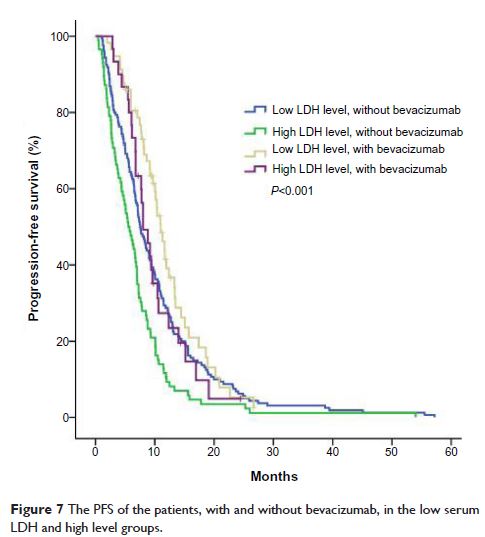108605
论文已发表
注册即可获取德孚的最新动态
IF 收录期刊
- 3.4 Breast Cancer (Dove Med Press)
- 3.2 Clin Epidemiol
- 2.6 Cancer Manag Res
- 2.9 Infect Drug Resist
- 3.7 Clin Interv Aging
- 5.1 Drug Des Dev Ther
- 3.1 Int J Chronic Obstr
- 6.6 Int J Nanomed
- 2.6 Int J Women's Health
- 2.9 Neuropsych Dis Treat
- 2.8 OncoTargets Ther
- 2.0 Patient Prefer Adher
- 2.2 Ther Clin Risk Manag
- 2.5 J Pain Res
- 3.0 Diabet Metab Synd Ob
- 3.2 Psychol Res Behav Ma
- 3.4 Nat Sci Sleep
- 1.8 Pharmgenomics Pers Med
- 2.0 Risk Manag Healthc Policy
- 4.1 J Inflamm Res
- 2.0 Int J Gen Med
- 3.4 J Hepatocell Carcinoma
- 3.0 J Asthma Allergy
- 2.2 Clin Cosmet Investig Dermatol
- 2.4 J Multidiscip Healthc

已发表论文
LDH 最初水平可预测中国转移性结直肠癌患者在一线的治疗中从贝伐单抗所获得的生存受益
Authors Yin CX, Jiang C, Liao FX, Rong YM, Cai XY, Guo GF, Qiu HJ, Chen XX, Zhang B, He WZ, Xia LP
Published Date August 2014 Volume 2014:7 Pages 1415—1422
DOI http://dx.doi.org/10.2147/OTT.S64559
Received 21 March 2014, Accepted 13 May 2014, Published 11 August 2014
Background: Markers to predict the efficacy of bevacizumab treatment have been not fully validated in most cancers, including metastatic colorectal cancer (mCRC). The aim of this study was to investigate the potential role of lactate dehydrogenase (LDH) in predicting the survival benefit from first-line bevacizumab treatment, in Chinese patients with mCRC.
Methods: All the patients were diagnosed with mCRC at the Sun Yat-sen University Cancer Center from 2003 to 2013. The study group and the control group were classified by receiving bevacizumab or not. The serum LDH value of all the patients had been detected before the first-line treatment. The primary end point was progression-free survival (PFS).
Results: The median PFS of the study and the control group (patients who received bevacizumab or not) was 11.3 and 9.1 months, respectively (P =0.004). In the control group, the median PFS of the high LDH level and the low LDH level groups was 6.9 and 10.2 months, respectively (P <0.001). However, in the study group, the corresponding median PFS was 9.9 and 11.9 months, respectively (P =0.145). In addition, for the low LDH level group, the median PFS was 11.9 and 10.2 months for patients who received bevacizumab or not, respectively (P =0.066); however, the median PFS of patients receiving bevacizumab or not was significantly different in the high LDH level group (9.9 and 6.9 months, respectively) (P =0.012).
Conclusion: The addition of bevacizumab in the first-line treatment setting could improve the PFS of mCRC patients notably. However, the benefit could only be potentially reflected on patients with high serum LDH level.
Methods: All the patients were diagnosed with mCRC at the Sun Yat-sen University Cancer Center from 2003 to 2013. The study group and the control group were classified by receiving bevacizumab or not. The serum LDH value of all the patients had been detected before the first-line treatment. The primary end point was progression-free survival (PFS).
Results: The median PFS of the study and the control group (patients who received bevacizumab or not) was 11.3 and 9.1 months, respectively (P =0.004). In the control group, the median PFS of the high LDH level and the low LDH level groups was 6.9 and 10.2 months, respectively (P <0.001). However, in the study group, the corresponding median PFS was 9.9 and 11.9 months, respectively (P =0.145). In addition, for the low LDH level group, the median PFS was 11.9 and 10.2 months for patients who received bevacizumab or not, respectively (P =0.066); however, the median PFS of patients receiving bevacizumab or not was significantly different in the high LDH level group (9.9 and 6.9 months, respectively) (P =0.012).
Conclusion: The addition of bevacizumab in the first-line treatment setting could improve the PFS of mCRC patients notably. However, the benefit could only be potentially reflected on patients with high serum LDH level.
Keywords: lactate dehydrogenase, PFS, progression-free survival
